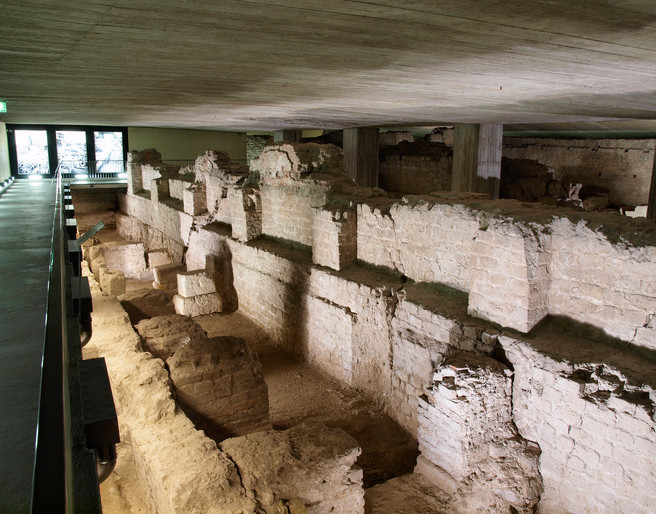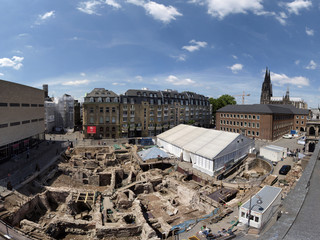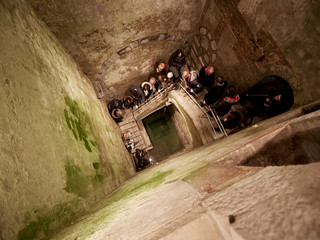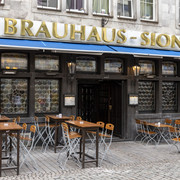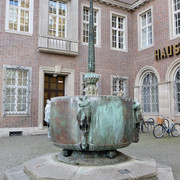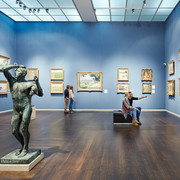MiQua: A window into the millennia of Cologne's history
MiQua, the LVR Jewish Museum in Cologne's Archaeological Quarter, promises to be a unique attraction in the heart of Cologne even before it opens. Here, in the heart of a city that sees the Rhine as a lifeline and its historical depth as heritage, history is made tangible. The underground excavations are a living testimony to 2000 years in which Roman structures, Jewish life and Christian craftsmanship determined the urban rhythm. These archaeological treasures are also a symbol of the ongoing human presence and change in the collective memory of today's metropolis.
The Praetorium: An imperial view of Cologne
The Praetorium, the Roman governor's palace, is an essential part of the MiQua experience. It has been part of the UNESCO Lower Germanic Limes World Heritage Site since 2021. The archaeological evidence you will see here is far more than just a collection of ancient stones. It is a place where historical powers marked their influence and a testimony to the city's ancient history. From its construction in the 1st century to its use by the Franks in the Middle Ages, the Praetorium remains an important point in Cologne's urban fabric. Here, past and present meet, and you will have the opportunity to immerse yourself in the social and administrative tasks of a long-gone administration.
Mikvahs, synagogues and the diversity of medieval Cologne
In addition to the Roman ruins, MiQua will unfold the rich Jewish life that characterised Cologne in the Middle Ages. The remains of a medieval synagogue and the mikveh, a ritual bath, invite visitors to reflect on religious and social life. The cultural interactions that took place and clashed in medieval Cologne will be visible at this location. The museum in the neighbourhood will therefore also be a monument to tolerance and a memorial to darkness, challenging us to learn from the past.
Sustainability and technology in harmony
But MiQua is intended to be more than historical reflection; it is a pioneering example of innovative museum design. State-of-the-art technology will bring the exhibits to life, creating an immersive experience that appeals to all generations. Interactive elements will allow you to actively engage with the material rather than just passively view it. A dialogue is created between you and the artefacts that will go far beyond the mere transfer of knowledge.
Ethical responsibility and cultural preservation
MiQua is also a model project in terms of social responsibility and cultural preservation. It should not only be a place for viewing and marvelling, but also for learning and critical debate. The history of the various cultural communities in Cologne invites visitors to reflect on topics such as diversity, inclusion and justice. The careful presentation of the artefacts using state-of-the-art technology is intended to reflect challenges of the time that are perhaps not so far removed from current issues.
Invitation to the past - and to the future
As MiQua emerges from the shadows of construction work and soon opens its doors, the invitation to become part of this journey lies before us. It is a meeting of the past with the irreversibility of the present - and the hope that understanding our history can lead us to a more just future. Anyone who visits the MiQua will not only leave with old knowledge, but also with a new perspective on the here and now.
Events at the MiQua:forum
Even now, you have the opportunity to gain insights into the MiQua and get to know it. Lectures, readings, discussions, demonstrations of archaeological practice and much more take place every Thursday in the Red House (Alter Markt 31, 50667 Cologne). The broad programme of events bridges the gap until the MiQua opens and whets the appetite for a future visit.
MiQua, the LVR Jewish Museum in Cologne's Archaeological Quarter, promises to be a unique attraction in the heart of Cologne even before it opens. Here, in the heart of a city that sees the Rhine as a lifeline and its historical depth as heritage, history is made tangible. The underground excavations are a living testimony to 2000 years in which Roman structures, Jewish life and Christian craftsmanship determined the urban rhythm. These archaeological treasures are also a symbol of the ongoing human presence and change in the collective memory of today's metropolis.
The Praetorium: An imperial view of Cologne
The Praetorium, the Roman governor's palace, is an essential part of the MiQua experience. It has been part of the UNESCO Lower Germanic Limes World Heritage Site since 2021. The archaeological evidence you will see here is far more than just a collection of ancient stones. It is a place where historical powers marked their influence and a testimony to the city's ancient history. From its construction in the 1st century to its use by the Franks in the Middle Ages, the Praetorium remains an important point in Cologne's urban fabric. Here, past and present meet, and you will have the opportunity to immerse yourself in the social and administrative tasks of a long-gone administration.
Mikvahs, synagogues and the diversity of medieval Cologne
In addition to the Roman ruins, MiQua will unfold the rich Jewish life that characterised Cologne in the Middle Ages. The remains of a medieval synagogue and the mikveh, a ritual bath, invite visitors to reflect on religious and social life. The cultural interactions that took place and clashed in medieval Cologne will be visible at this location. The museum in the neighbourhood will therefore also be a monument to tolerance and a memorial to darkness, challenging us to learn from the past.
Sustainability and technology in harmony
But MiQua is intended to be more than historical reflection; it is a pioneering example of innovative museum design. State-of-the-art technology will bring the exhibits to life, creating an immersive experience that appeals to all generations. Interactive elements will allow you to actively engage with the material rather than just passively view it. A dialogue is created between you and the artefacts that will go far beyond the mere transfer of knowledge.
Ethical responsibility and cultural preservation
MiQua is also a model project in terms of social responsibility and cultural preservation. It should not only be a place for viewing and marvelling, but also for learning and critical debate. The history of the various cultural communities in Cologne invites visitors to reflect on topics such as diversity, inclusion and justice. The careful presentation of the artefacts using state-of-the-art technology is intended to reflect challenges of the time that are perhaps not so far removed from current issues.
Invitation to the past - and to the future
As MiQua emerges from the shadows of construction work and soon opens its doors, the invitation to become part of this journey lies before us. It is a meeting of the past with the irreversibility of the present - and the hope that understanding our history can lead us to a more just future. Anyone who visits the MiQua will not only leave with old knowledge, but also with a new perspective on the here and now.
Events at the MiQua:forum
Even now, you have the opportunity to gain insights into the MiQua and get to know it. Lectures, readings, discussions, demonstrations of archaeological practice and much more take place every Thursday in the Red House (Alter Markt 31, 50667 Cologne). The broad programme of events bridges the gap until the MiQua opens and whets the appetite for a future visit.
Useful Information
Openings
Currently closed
Currently closed.
Eligibility
for Groups
for Class
for families
for individual guests
Pet allowed
Parking facilities
You can easily reach the (H) Alter Markt station on tram line 5. From here it is only about 50 metres to MiQua. The Red House is located on the Alter Markt itself.
